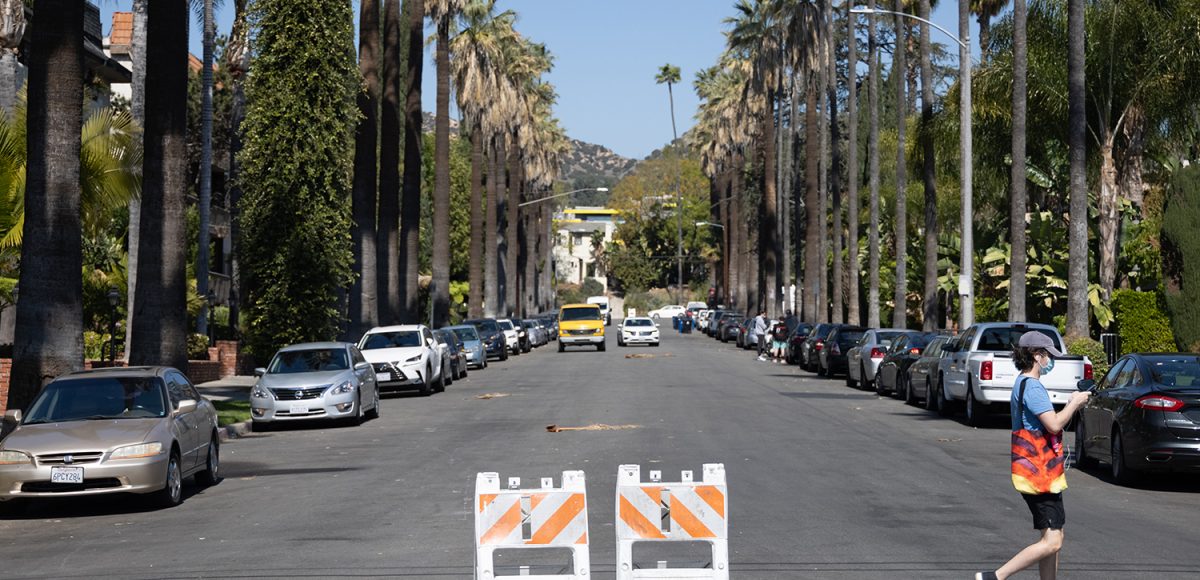The Beverly Hills City Council grappled with the impact of COVID-19 on the city’s most vulnerable at its March 2 meetings. At the Study Session, the Council heard updates on the city’s rent relief program targeted at those affected by the pandemic. The Council voted to approve a Neighborhood Slow Streets Program, which would allow residential blocks to restrict their roadways to local traffic only. Finally, the Council voted at the Regular Session to overhaul the city’s process of soliciting and securing contracts for goods and services.
In response to the mounting pressure on renters by the economic toll of COVID-19, the City Council approved the creation of a rent subsidy program at its Sept. 15 Regular Meeting. Though initially vested with $715,000, the Council expanded the program to $1.1 million in December. The program applied to tenants living on multi-family properties that fall under the Rent Stabilization Ordinance (RSO), prioritizing seniors and households with children enrolled in Beverly Hills Unified School District. The program offered eligible residents up to $1,000 for three months to make up the remaining balance of unpaid rent. The funds went directly to the landlord under the condition that the landlord grant the tenant a year to repay back rent. In return, participating landlords will also have to agree not to evict tenants for a year. The program is administered by Jewish Family Services (JFS), a non-profit that offers a range of services throughout L.A.
The Council received the first comprehensive update on March 2 since the application period closed on Dec. 7. Potentially an indication of the economic pain radiating through Beverly Hills, the city received more than double the expected number of applications for assistance. While the city anticipated about 200, according to Deputy Director of Rent Stabilization Helen Morales, it fielded a total of 520.
Morales broke down the status of the applications. Of the 520, staff were able to reject 40 out of hand because the tenant either lived in a non-RSO unit, the tenant received the Los Angeles County Rent Relief Program subsidy, or the tenant’s monthly rent ran higher than $4,000. Of the 480 remaining, JFS has made final determinations of 91, raising concerns about the speed of the process. Then, of those reviewed, only 21 were deemed eligible for the assistance.
“When I see that our denial rate was 77 percent and our approval rate was 23 percent, that really is devastating in terms of percentages,” said Councilmember Lili Bosse.
Morales defended the numbers, saying that even though many applicants truly believed themselves financially harmed by COVID-19, other forms of government assistance had sometimes made up for or exceeded lost wages. “When we were doing a comparison of what their current income was post- and pre-COVID, there was no change, and in some cases, they earned more with receiving [unemployment insurance] payments than they did before COVID-19.”
Beyond that, Morales identified three impediments to a higher approval rate: applicants’ lack of documentation showing a financial impact as a result of COVID-19; landlords’ refusal to sign documentation, including a statement saying they would not evict a tenant for failing to pay back rent; and difficulty coordinating with the County to avoid granting money to a resident already receiving money from the County.
Morales explained that many landlords believe that by refusing the subsidy, they can evict a tenant as soon as the crisis ends, possibly renting the units at market rate. As City Attorney Laurence Weiner explained, California’s recently enacted SB 91 makes it considerably harder for landlords to evict tenants for unpaid rent over the course of the pandemic, thus incentivizing landlords to cooperate with assistance programs. Morales said after explaining this to some landlords, they have reversed their positions. The holdouts, she said, have tended to be corporate landlords.
Council members expressed frustration at the refusal of some landlords to participate in the program. Councilmember Bosse suggested that the City Attorney draft a letter explaining the rules regarding eviction to landlords. Going further, Councilmember John Mirisch suggested exploring a measure that would disincentivize evicting tenants in these cases. Mayor Lester Friedman agreed, saying, “We do need to look at it and see if there is something that we can craft that would take away that incentive from the landlord.”
As a silver lining, Morales said the city has only spent $288,000 of $1.1 million allocated to the fund, leaving open the possibility of another round of applications. “I do think that because our eligible candidates are less, we will have additional funds available and we can open up another period and request additional applications at that time,” she said.
Also at the March 2 Study Session, the Council voiced unanimous support to move forward with a Neighborhood Slow Streets Program. The COVID-19 pandemic has reshaped the relationship between residents and their immediate surroundings. As a result of stay-at-home orders and remote working, many people spend more time at home and in their neighborhoods when they would otherwise be at work or school. In response to this paradigm shift, cities like Los Angeles, San Francisco, and Pasadena have implemented Slow Streets Programs, reducing traffic volume and creating a safer environment for residents to walk, bike and exercise safely.
“I am extremely supportive of this,” said Councilmember Bosse. “It encourages less traffic, encourages more walkability, encourages people to be outside, [and] it does not stop people who live on the street to have access to their homes.”
Bosse, whose “Walk With the Mayor” initiative during her stint as mayor promoted active lifestyles in the city, went as far to suggest the program could be extended after the pandemic.
The program only applies to local residential street blocks with a 25 mile per hour speed limit. It does not extend to collector or arterial roads. The block must be sponsored by a resident and reviewed by staff from the Public Works, Police and Fire Departments. Then, the sponsor must receive support from at least 51 percent of block residents.
Successfully completing this process would result in placement of signage with barricades and traffic cones at both ends of the street. The exact form of the barricade and signage would depend on the width available, City Engineer Daren Grilley told the Council. Generally, though, Grilley said the city would place an a-frame barricade in the street, “Most likely near the right shoulder, so that it wouldn’t impact traffic, but it would be clearly visible to anybody coming into that neighborhood.”
Grilley admitted that apart from the signage, the program lacks teeth. “It’s aspirational, it’s not enforceable,” he said, though he pointed to positive early data from other participating cities.
Councilmember Julian Gold expressed concern that if too many blocks seized on the program, it could hurt traffic in the city. Most other council members seemed unworried about that prospect and instead waxed nostalgic about their childhoods playing safely in the street. While Grilley clarified that some team sports could potentially violate COVID-19 public safety measures, kids (or adults) could throw a football–or even, as Gold offered from his own childhood, stickball.
“I think that would be fantastic if people started doing that,” said Grilley.
Finally, the Council unanimously voted to make changes to the city municipal code and overhaul the city’s process of procuring contracts for goods and services at the Regular Session. As a part of the overhaul, the Council updated the city’s tiered system of delegating purchases. Currently, the city has four “approval levels” for granting con- tracts and making purchases. At existing levels, the City Council approves bids over $50,000, a significantly lower threshold than in cities like Burbank, Mountain View, or Santa Monica. The City Manager approves bids up to $50,000, the Director of Finance oversees bids up to $25,000, and department heads approve bids up to $7,500.
This tiered system is meant to delegate tasks, freeing up the City Council to consider the largest contracts. However, approval levels have not been changed since 2006 and the staff report compiled for the Study Session notes that the “relatively low current City Council threshold results in additional agenda items for many routine contracts or purchases, requiring significant staff and City Council time.”
Now, the city increased its approval levels for the City Council to over $100,000, up to $100,000 for the City Manager, up to $50,000 for the Director of Finance, and up to $10,000 for department heads. The Council also expressed support for reviewing the changes again in three to five years.
“It shouldn’t have taken 15 years,” said Councilmember Mirisch.







